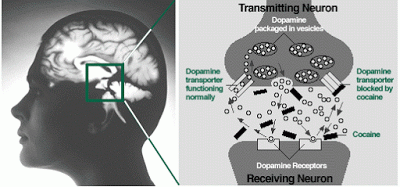A Receptor in the Brain Makes Cocaine Relapse More Likely
“Drugs are addictive because they “hijack” the brain’s reward system, which is actually intended to make it pleasurable to eat and have sex, behaviors that are necessary for survival and reproduction.”Cocaine, a highly addictive drug, also technically known as benzoylmethylecgonine, is a crystalline tropane alkaloid (naturally occurring chemical compound containing nitrogen) that is obtained from the leaves of the coca plant. The drug acts as a stimulant of the central nervous system, an appetite suppressant, and a topical anesthetic. Specifically, cocaine is a serotonin-norepinephrine-dopamine reuptake inhibitor (SNDRI), which mediates functionality of said neurotransmitters.Basically, cocaine acts as a chemical in the brain that blocks the action of transporters of serotonin, norepinephrine and dopamine. This blocking increases extracellular concentrations around those specific neurotransmitters and increases

 “Drugs are addictive because they “hijack” the brain’s reward system, which is actually intended to make it pleasurable to eat and have sex, behaviors that are necessary for survival and reproduction.”
“Drugs are addictive because they “hijack” the brain’s reward system, which is actually intended to make it pleasurable to eat and have sex, behaviors that are necessary for survival and reproduction.”
Cocaine, a highly addictive drug, also technically known as benzoylmethylecgonine, is a crystalline tropane alkaloid (naturally occurring chemical compound containing nitrogen) that is obtained from the leaves of the coca plant.
The drug acts as a stimulant of the central nervous system, an appetite suppressant, and a topical anesthetic. Specifically, cocaine is a serotonin-norepinephrine-dopamine reuptake inhibitor (SNDRI), which mediates functionality of said neurotransmitters.
Basically, cocaine acts as a chemical in the brain that blocks the action of transporters of serotonin, norepinephrine and dopamine. This blocking increases extracellular concentrations around those specific neurotransmitters and increases their affects. In this type environment, higher levels of serotonin, noradrenalin, adrenaline or dopamine can be transmitted leading to increased euphoria.
Cocaine is highly addictive because of the way it affects the mesolimbic reward pathway (a pathway for dopamine). The addiction can persist long after periods of sobriety. The effect cocaine has on the brain is long-lasting making relapse very likely. For instance, relapse may occur simply by exposure to a situation associated with its use.
New research from Linköping University has pinpointed a specific molecule in the brain that may affect the addict’s chance of relapse. According to the study, led by David Engblom, associate professor of neurobiology at Linköping University in Sweden, “a receptor for the signal substance glutamate (mGluR5), in a part of the brain called the striatum, plays a major role in relapses.”
Also, he continues,
“our findings show that the mice who lacked the receptor were less prone to relapse. This is due the fact that their reaction to reward had not been etched into their memories in the same ways as in normal mice. The receptor seems to be a prerequisite for objects or environments that were previously associated with taking drugs, or something else rewarding, to create a craving”.
This discovery should lead to further research into the understanding of cocaine addiction and its effects on the brain, as well as, the development of new methods for treating cocaine addiction.
Why the Craving for Cocaine Won’t Go Away
Cocaine
Serotonin–norepinephrine–dopamine reuptake inhibitor
© www.understandingaddictions.com
SOURCE: Understanding Addictions – Read entire story here.








